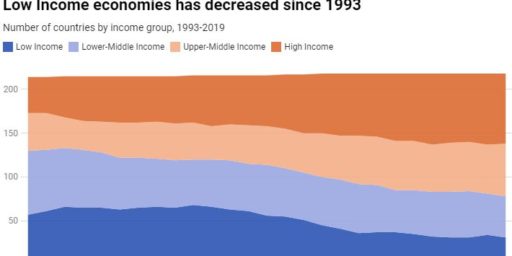Who Are the Pro-Americans?
Anne Applebaum examines the flip side of recent polls showing majorities in several Western European countries having anti-American attitudes.
Who Are the Pro-Americans? (WaPo, A21)
So familiar are the numbers, and so often have we heard them analyzed, that the release of a new poll on international anti-Americanism last week caused barely a ripple. Once again the Pew Global Attitudes Project showed that most Frenchmen have a highly unfavorable view of the United States; that the Spanish prefer China to America; and that Canadian opinion of the United States has sunk dramatically. And once again the polls told only half of the story. After all, even the most damning polls always show that some percentage of even the most anti-American countries remains pro-American. According to the new poll, some 43 percent of the French, 41 percent of Germans, 42 percent of Chinese and 42 percent of Lebanese say they like us. Maybe it’s time to ask: Who are they?
In fact, when pro- and anti-American sentiments are broken down by age, income and education — I did so recently using polling data from the Program on International Policy Attitudes, supplied by Foreign Policy magazine — patterns do emerge. It turns out, for example, that in Poland, which is generally pro-American, people between the ages of 30 and 44 are even more likely to support America than their compatriots. This is the group whose lives would have been most directly affected by the experience of the Solidarity movement and martial law — events that occurred when they were in their teens and twenties — and who have the clearest memories of American support for the Polish underground.
[…]
Looking around the world, it is clear there are classes of people who might also be called aspirational. They are upwardly mobile, or would like to be. They tend to be pro-American, too.
In Britain, for example, 57.6 percent of those whose income are low believe that the United States has a mainly positive influence in the world, while only 37.1 percent of those whose income are high believe the same. Breaking down the answers by education, a similar pattern emerges. In South Korea, 69.2 percent of those with low education think the United States is a positive influence, while only 45.8 percent of those with a high education agree. That trend repeats itself not only across Europe but in many other developed countries. Those on their way up are pro-American. Those who have arrived, and perhaps feel threatened by those eager to do the same, are much less so.
In developing countries, by contrast, the pattern is sometimes reversed. It turns out, for example, that Indians are much more likely to be pro-American if they are not only younger but also wealthier and better educated, and no wonder. Because India has only recently been open to foreign investment, younger Indians have had the experience of working with Americans, whereas their parents have not. The poor in India are still untouched by globalization, but the middle and upper-middle classes — those who see for themselves a role in the English-speaking, American-dominated international economy — are aspirational, and therefore pro-American. Some 69 percent of Indians with high incomes think the United States is a mainly positive influence in the world, and only 29 percent of those with low incomes agree. This same phenomenon may also account for the persistence of a surprising degree of popular pro-Americanism in such places as Vietnam, Indonesia, Brazil and the Philippines. They’re getting wealthier — like Americans — but aren’t yet so rich as to feel directly competitive.
True, these pro-Americans may not be a majority, either in the world or in their own countries. But neither are they insignificant. Pro-Americans will vote for pro-American politicians, who sometimes win, even in Europe. They will also purchase American products, make deals with American companies, vacation in the United States if we give them visas to do so. They are worth cultivating, with presidential speeches or diplomatic visits, because their numbers may even grow if their economies expand, if their markets grow freer, if they begin to see the global economy as a promise and not a threat. Before Americans brush off the opinion of the “foreigners” as unworthy of attention, they should remember that whole chunks of the world have a natural affinity for them and, if they are diligent, always will. Happy Fourth of July.
Interesting stuff. She expands her thoughts on this in Foreign Policy magazine.






I have business contacts around the world in 4 english speaking countries and south korea. My own informal research is unfortunately only with the educated and “already there” types. I can vouch for their general anti-americanism. One thing to note however is that it is far more nuanced than a poll might suggest. The anti- americanism I encounter is more of an anti-bushism and pro-americanism. In fact, I think they might describe america in terms that are quite different from those they might use to describe this administration.
I think it is interesting to note that the less education you have, the more likely you are to support “america” -meaning bush. That seems to be true in the US too. Maybe education makes us stupid.
I’ve got to agree with Bruce. Many foreigners I’ve met don’t hide their disdain for American policies (even before Bush took office), but are very warm and welcoming toward individual Americans. Many will even explain that to you.
My observances are scientific by no means… But I’ve been to 28 countries (and counting), and the only places where I’ve been treated badly for simply being American were France and Canada. Places I’ve been treated the best? Pakistan and Egypt.
The Pakistanis are wonderful people. It was a great experience. I’m a better person for having been there and met some of those people.
THank you ALS,
Yes, to be more specific, american policies in general. Bush is unique in some ways and seems to generate special comments, but in general, I have not seen americans lumped in with american policy.
Can’t say that I have had your experience in Canada and I don’t do business in France and I’ve never been there.